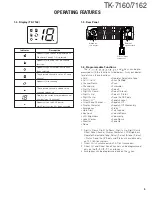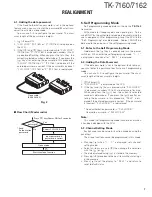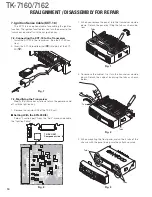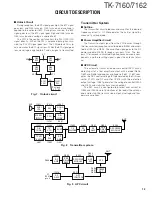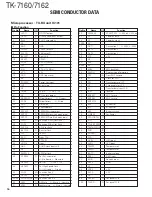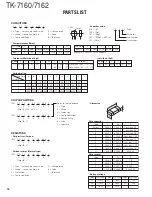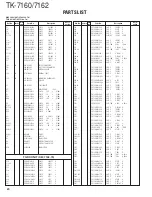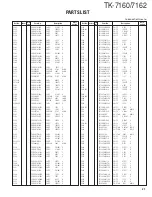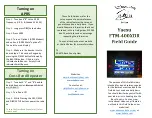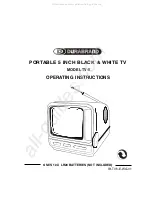
TK-7160/7162
6
REALIGNMENT
1. Modes
Mode
Function
User mode
For normal use.
PC mode
Used for communication between the
transceiver and PC (IBM compatible).
PC programming
Used to read and write frequency data and
mode
other features to and from the transceiver.
PC test mode
Used to check the transceiver using the PC.
This feature is included in the FPU.
PC tuning mode
Used to tune the transceiver using the PC.
Clone mode
Used to transfer programming data from
one transceiver to another.
∗
Self programming
You can program the frequency, signalling and
mode
other functions using only the
transceiver
.
∗
: Only TK-7160 transceiver
2. How to Enter Each Mode
Mode
Operation
User mode
Power ON
PC mode
Received commands from PC
Clone mode
[
]+Power ON (Two seconds)
* Self programming mode
[
]+Power ON (Two seconds)
∗
: Only TK-7160 transceiver
3. PC Mode
3-1. Preface
This transceiver is programmed using a personal com-
puter, a programming interface (KPG-46) and programming
software (KPG-99D(E)).
The programming software can be used with an IBM PC
or compatible. Figure 1 shows the setup of an IBM PC for
programming.
3-2. Connection Procedure
1. Connect the transceiver to the personal computer with
the interface cable.
2. When the Power is switched on, user mode can be en-
tered immediately. When the PC sends a command, the
transceiver enters PC mode.
When data is transmitted from transceiver, the TX indica-
tor blink.
When data is received by the transceiver, the BUSY indi-
cator blink.
In the PC mode, “PROGRAM” (TK-7160) or “P” (TK-7162)
is displayed on the LCD.
User mode
PC mode
PC programming mode
Clone mode
PC test mode
PC tuning mode
∗
Self programming mode
IBM-PC
KPG-46
TK-7160/TK-7162
KPG-99D(E)
Fig. 1
3-3. KPG-46 Description
(PC programming interface cable : Option)
The KPG-46 is required to interface the transceiver to the
computer. It has a circuit in its D-subconnector (25-pin) case
that converts the RS-232C logic level to the TTL level.
The KPG-46 connects the modular microphone jack of the
transceiver to the computers RS-232C serial port.
3-4. Programming Software Description
KPG-99D(E) is the programming software for transceiver
supplied on a CD-ROM. This software runs under Windows
98, ME, Windows 2000 or XP on an IBM-PC or compatible
machine.
The data can be input to or read from transceiver and ed-
ited on the screen. The programmed or edited data can be
printed out. It is also possible to tune the transceiver.
4. Clone Mode
Programming data can be transferred from one trans-
ceiver to another by connecting them via their modular micro-
phone jacks. The operation is as follows (the transmit trans-
ceiver is the master and the receive transceiver is the slave).
Note :
Clone mode should be enabled.
1. Turn the master transceiver power ON with the [
] key
held down (2 seconds), “CLONE” (TK-7160) or “C” (TK-
7162) is displayed on the LCD.
2. Power on the slave transceiver.
3. Connect the cloning cable (No. E30-3382-05) to the modu-
lar microphone jacks on the master and slave.
4. Press the [
] key on the master transceiver. The data of
the master is sent to the slave. While the master is send-
ing data, red LED blinked. While the slave is receiving the
data, “PROGRAM” (TK-7160) or “P” (TK-7162) is dis-
played and green LED blinked. When cloning of data is
completed, the master displays “END” (TK-7160) or “E”
(TK-7162), and the master red LED turned off, and the
slave automatically operates in the User mode. The slave
can then be operated by the same program as the master.
5. The other slave can be continuously cloned. Carry out the
operation in step 2 to 4.





